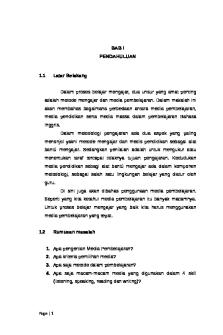Materi grammar bahasa inggris PDF

| Title | Materi grammar bahasa inggris |
|---|---|
| Pages | 67 |
| File Size | 9.6 MB |
| File Type | |
| Total Downloads | 71 |
| Total Views | 197 |
Summary
BASIC ENGLISH GRAMMAR ERWIN HARI KURNIAWAN SMA3 PRESS MOBILE 085645781246 EDC-SMA NEGERI 3 KEDIRI 2010/2011 WRITTENBY: ERWIN HARI KURNIAWAN [email protected] DEDICATED TO: MY PARENTS BELOVED WIFE AND MY SWEET SON, DANISH 1 EDC-SMA NEGERI 3 KEDIRI 2010/2011 TENSES Tenses adalah perubahan kata ke...
Description
Accelerat ing t he world's research.
Materi grammar bahasa inggris Ghaffar Iqbal
Related papers
Download a PDF Pack of t he best relat ed papers
T HE EFFECT IVENESS OF T EAMS GAMES T OURNAMENT (T GT ) T ECHNIQUE ON ST UDENT S' M… Nabila Nisa
BASIC ENGLISH GRAMMAR
ERWIN HARI KURNIAWAN SMA3 PRESS MOBILE 085645781246
EDC-SMA NEGERI 3 KEDIRI 2010/2011
WRITTENBY: ERWIN HARI KURNIAWAN [email protected]
DEDICATED TO: MY PARENTS BELOVED WIFE AND MY SWEET SON, DANISH
1
EDC-SMA NEGERI 3 KEDIRI 2010/2011
TENSES
Waktu
Present Simple Present
Past Simple Past
Future Simple Future
Sifat Kejadiannya
Tenses adalah perubahan kata kerja yang dipengaruhi oleh waktu dan sifat kejadian. Semua kalimat dalam bahasa Inggris tidak lepas dari tenses karena semua kalimat pasti ada hubungannya dengan waktu dan sifat kejadiannya.
Present Continouos Present Perfect
Past Continouos Past Perfect
Future Continouos Future Perfect
Present Perfect Continuous
Past Perfect Continuous
Future Perfect Continuous
A.
SIMPLE PRESENT Pola Kalimat (+) S + V-1 (s/es) + O + keterangan waktu. (-) S + do/does + not + V-1 + O + keterangan waktu. (?) Do/does + S + V-1 + O + keterangan waktu? Contoh : (+) You study English at MEC everyday. (-) You don't study English at MEC everyday. (?) Do you study English at MEC everyday? 1.
Kalau subjek kalimat orang ketiga tunggal (the third person singular-she/he/it), kata kerja harus ditambah dengan "s" atau "es" dalam kalimat positif (positive statement). Contoh: Mary usually goes swimming on Saturday morning. Mother always serves our breakfast before we go to school. My brother likes playing tennis on Sunday morning. 2
EDC-SMA NEGERI 3 KEDIRI 2010/2011
2.
3.
Akhiran "s" pada kata kerja Pada umumnya kata kerja ditambah dengan akhiran "s" jika subjeknya orang ketiga tunggal (the third person singular he/she/it). Contoh: I work five days a week. We play tennis every Sunday The boys play in the garden She works five days a week. Father takes a train to go to office. A mouse eats my food every morning Akhiran "es" digunakan pada kata kerja yang huruf akhirnya "s, ch, sh, x, o", jika subjeknya orang ketiga tunggal. Sedangkan kata kerja yang huruf akhimya "y" dan didahului huruf mati, y ditukar dulu dengan "i" kemudian ditambah "es" Contoh: I pass the house. You watch television. We wash our clocthes. They go to office. I study English He passes the house. John goes to office. She washes her clothes. She watches television. He studies English
4.
.Kalimat menyangkal (negative) Kalimat menyangkal (negative) dibentuk dengan menempatkan "do not/don't atau does not/doesn't" sesudah subjek kalimat. "Doesn't" digunakan untuk orang ketiga tunggal (he doesn't, she doesn't, it doesn't), sedangkan "don't" 3
EDC-SMA NEGERI 3 KEDIRI 2010/2011
digunakan untuk selain orang ketiga tunggal (I don't, you don't, we don't, they don't). Contoh: You don't go swimming on Monday. We don't work on Saturday. I don't work at the aircraft factory. He doesn't work on Saturday. My brother doesn't play football every day. John doesn't work at the aircraft company . 5.
Kalimat tanya (interrogative) Kalimat tanya (interrogative) dibentuk dengan menempatkan kata Bantu "do atau does"di depan kalimat. "Does" digunakan untuk orang ketiga tunggal (he, she, it), sedangkan "do" digunakan untuk selain orang ketiga tunggal (I, you, we, they). "Do/does" dalam kalimat tanya artinya"apakah" dan kata kerjanya tidak lagi menggunakan akhiran "s/es" walaupun subjek kalimatnya orang ketiga tunggal Contoh: Do you always go to office by train? Do they go swimming every Sunday? Do the boys like this film? Does your brother work for bank Mandiri ? Does he go swimming every Sunday? Does the boy like this film?
4
EDC-SMA NEGERI 3 KEDIRI 2010/2011
6.
B.
C.
Kesesuaian subject dan auxiliary verb di tenses ini adalah sebagai berikut: DO digunakan oleh subject I, you, we, dan they. DOES digunakan oleh subject she, he, dan it. Penggunaan 1. Simple Present digunakan untuk menunjukkan suatu peristiwa, kejadian, kegiatan yang terjadi berulang-ulang, atau merupakan suatu kebiasaan (habit). Contoh: I leave for office at 6 every morning. My father works five days a week. Father always drinks tea in the afternoon. 2. Simple Present juga digunakan untuk menunjukkan suatu fakta (fact) atau suatu yang merupakan kebenaran umum (general truth). Contoh: The River Nile flows into Mediterranean. Jet engines make a lot of noise. Vegetarians don't eat meat and fish. 3. Simple Present juga digunakan untuk menunjukkan sesuatu yang akan terjadi di waktu yang akan datang, jika kita membicarakan suatu Jadwal, program, dan lain-lain. Contoh: The second train leaves at 10 a.m. The football match starts at 4 p.m tomorrow. The second film begins at 7 p.m. Keterangan Waktu (Adverb of time) 1. Adverb of frequency always : selalu Usually : biasanya generally : umumnya ever (?) : pernah Sometimes : kadang-kadang occasionally : kadarag-kaclang 5
EDC-SMA NEGERI 3 KEDIRI 2010/2011
never Seldom 2.
: tidak pernah : jarang
Adverb of quantity once … : sekali ... once a day : sekali dalam sehari once a week : sekali dalam seminggu twice … : dua kali ... three times … : tiga kali dalam ... every … : setiap ...
Exercise A. Make the sentences using the phrases below a) eat breakfast b) go to class c) put on my clothes d) drink a cup of coffee/tea e) shave f) put on my make-up g) take a shower/bath h) get up i) pick up my books j) walk to the bathroom k) watch TV l) look in the mirror m) turn off the alarm clock n) go to die kitchen/the cafeteria o) brush/comb my hair p) say good-bye to my roommate, wife/husband q) brush my teeth r) do exercises s) wash my face t) stretch, yawn, and rub my eyes
6
EDC-SMA NEGERI 3 KEDIRI 2010/2011
B. Put the following sentences into simple present. Use the words in parentheses! 1. My sister still … (make) some mistakes in pronunciation. 2. Hendry always … (do) his weekly report on Monday afternoon. 3. Mr. David's secretary always … (type) a lot of letters in the office. 4. Some of us … (work) overtime on Saturday. 5. He … (come) early because he … (want) to see you. 6. They always … (report) to their superior once a week. 7. Our receptionist always … (serve) the customers patiently. 8. His assistant never … (forget) to record the daily transactions. 9. One of them often … (pass) my house in the morning. 10. We …… (go) to the seaside every Saturday. C.
Change the following sentences into negative! 1. The man comes here just to take this letter. 2. One of my brothers works for Bank of America in Jakarta. 3. He makes his weekly report regularly. 4. My manager always spends a lot of money on books every month. 5. The cashier goes to the bank to cash the cheque.
D.
Change the following sentences into interrogative! 1. The man withdraws some money from his account once a week. 2. One of the men wants to see our manager this afternoon. 3. Some of them always finish their work on time. 4. My friend teaches English twice a week. 5. We always start work at 8 o'clock every morning.
7
EDC-SMA NEGERI 3 KEDIRI 2010/2011
E.
First, read and complete the text with phrases from the box.
wakes the children up many times taxi
10 p.m. 20 children 6 o'clock very tired gives them breakfast bus St Johns Hospital
My name is Jennie. I’m a nurse......................................and I work at................................................I look after sick children at night. I start work at.............................................................and finish early at...........................................in the morning. I go to work by ........................................................ but I come home in the morning by.......................................................................because I’m tired. I have...........................................in my section. I look at the children................................................. during the night. Sometimes I sit and talk to a child. The children sleep most of the time. At 6 o'clock the day nurse arrives and………………............................................. She ................................................................. at 7 o'clock. I go home and go to bed at 8 o'clock. I usually feel ........................................... F. 1. 2. 3. 4. 5. 6. 7. 8. 9. 10. 11.
Now use this information to complete the questions that John asks Jennie. What do you do? Where.............................................................................................? What time.......................................................................................? What time.......................................................................................? How................................................................................................? How................................................................................................? How many......................................................................................? How often......................................................................................? When..............................................................................................? What ............................................................................at 7 o'clock? How..................................................................when you go home?
8
EDC-SMA NEGERI 3 KEDIRI 2010/2011
G.
Write the missing verbs in the sentences below. Choose from the following: cry dence drink drive laugh listen put read run sing sleep study swim want write
1. 2. 3. 4.
Alice and Max are learning to dance the tango. We usually____________football songs on the bus. 1 feel tired today because 1 didn't.____________last night. He doesn't go to the beach because he can't____________ very well. I always____________to the news on the radio in the morning. Are we going to____________to the airport or go by bus? It's a really sad film. It made me____________. I think I'll____________some letters tonight. Jim Carrey is so funny. He always makes me____________. Don't____________all the orange juice now. Leave some for breakfast. I always____________the newspaper before I go to work. The bus is at the stop now. If we____________, we'll catch it. She's not hungry. She doesn't____________any cake. I'd like to____________medicine at college. Shall I____________the milk in the fridge?
5. 6. 7. 8. 9. 10. 11. 12. 13. 14. 15.
9
EDC-SMA NEGERI 3 KEDIRI 2010/2011
A.
PRESENT CONTINUOUS TENSE Pola Kalimat (+) S + to be (is,am,are) + V-ing + O+ keterangan waktu. (-) S + to be (is,am,are) + not + V-ing + O+ keterangan waktu (?) To be (is,am,are) + S + V ing + O+ keterangan waktu? Contoh : (+) We are studying English at BEC now. (-) We aren't studying English at BEC now (?) Are we studying English at BEC now? 1. Kalimat menyangkal (negative) Kalimat menyangkal (negative) dibentuk dengan menambahkan "not" sesudah to be (am not, is not/isn't, are not/aren't) dan ditempatkan sesudah subjek kalimat. Contoh : Mary is not/isn't typing the monthly report. The students are not/aren't studying English in the classroom. I'm not/ am not preparing a minute of meeting. 2. Kalimat tanya (interrogative) Kalimat tanya (interrogative statement) dibentuk dengan menempatkan to be (is, am, atau are) di depan kalimat. Dalam kalimat tanya to be "am, is, atau are" artinya "apakah". Contoh : Are you doing your homework? Is your father still working in the office? Are the children playing in the garden? 3. Kesesuaian subject dan auxiliary verb di tenses ini adalah sebagai berikut : AM digunakan oleh subject I. IS digunakan oleh subject she, he, dan it. ARE digunakan oleh subject you, we, dan they.
B.
Penggunaan 1. Present continuous tense digunakan untuk menunjukkan suatu kejadian atau peristiwa yang sedang terjadi atau berlangsung 10
EDC-SMA NEGERI 3 KEDIRI 2010/2011
saat kita sedang bicara Contoh: My brother is painting the house. Please be quiet! The baby is sleeping. Listen! The neighbors are quarrelling again. 2. Present continuous tense digunakan untuk menunjukkan suatu kejadian atau peristiwa yang bersifat sementara (temporary). Contoh: I am living with my friend until I can find a house. This machine is not working well. John is living in his friend's flat at the moment. David is always busy because he is working on his thesis. 3. Present continuous tense digunakan tamtuk menunjukkan suatu keadaan atau situasi yang berubah-ubah. Contoh: The population of Indonesia is rising very fast. Our economic situation is already very bad and it is getting worse. The cost of living is increasing. Every month things are dearer. 4. Present continuous tense digunakan untuk menunjukkan sesuatu yang akan dilakukan di waktu yang akan datang dan telah direncanakan atau ditentukan sebelumnya. Contoh: I am meeting my father at the station tomorrow morning. We are holidaying in Europe next month. My father is having a meeting with his staff tomorrow morning. 5. Beberapa kata kerja tidak digunakan dalam present continuous tense. Kita tidak boleh mengatakan, "I am liking mango very much," tapi kita harus mengatakan, "I like mango very much." Beberapa kata kerja yang tidak digunakan daIam present continuous tense adalah: kata yang menyangkut pancaindera : see, hear, notice, recognize. 11
EDC-SMA NEGERI 3 KEDIRI 2010/2011
kata-kata yang menyangkut emosi : want, desire, smell, notice, forgive, wish, care, like, hate, adore, dislike. kata-kata yang menyangkut pikiran : think, feel, realize, understand, know, mean, suppose, believe, expect, remember, recollect, forget, recall, trust, mind. kata-kata yang menyangkut milik : own, belong, possess. kata-kata kerja seperti : seem, signify, appear,- contain, consist, keep, concern, matter Contoh : a. I am knowing her well. (Poor) I know her well. (Good) b. I am understanding what you are meaning (Poor) I understand what you mean. (Good) C. Kata/frase yang biasa digunakan dalam present continuous tense Now : Sekarang At present : Sekarang Ini . At this moment : Pada Saat Ini Right now : Sekarang Ini Still : Masih Look : Lihat Listen : Dengarkan Exercise A Put the following sentences into present Continuous. Use the words in parentheses! 1. One of my assistants … (correct) the financial report. 2. Some of them … (work) in the factory. 3. The two men … (discuss) their new plans. 4. The girl … (take) something in that room. 5. My assistant … (analyze) their proposal in his room. 6. She … (talk) to one of our regular customers in that room. 7. My friend… (Park) his car beside that building. 8. The mechanic… (Repair) my car in my garage. 9. One of them … (try) to open the door. 10. They … (do) their English exercises in the classroom. 12
EDC-SMA NEGERI 3 KEDIRI 2010/2011
B.
C.
D.
Change the following sentences into negative! 1. My accountant is calculating the total expenses we need. 2. My little sister is returning the books to the library. 3. The guests are having lunch with my supervisor. 4. John is paying the food he ordered. 5. My supervisor is still training some new employees in the training room. Change the following sentences into interrogative! 1. She is doing something in the meeting room. 2. The investors are calling all mechanical staffs in London. 3. Billy is reporting to his boss in the head office. 4. Brenda is recording all today's transactions. 5. The receptionists are still talking to one of my guests. Look at the picture and the description. Re-write the description to make it correct.
Steve is reading a newspaper. The children, Sam and Eric, are playing with a ball. They are both wearing sunglasses. Pam is cooking chicken. She's laughing because the smoke is getting in her eyes. Jo is standing with her mother and is listening to music on her personal stereo. She is eating an orange. Fred, the dog, is lying on the grass asleep. 1. Steve is not reading newspaper. He is reading a book 2. Sam and Eric..........................................'.............................................. 13
EDC-SMA NEGERI 3 KEDIRI 2010/2011
3. 4. 5. 6. 7. 8.
................................................................................................................. ................................................................................................................. ................................................................................................................. ................................................................................................................. ................................................................................................................. ................................................................................................................ . E. Simple present vs. present progressive. Directions: Use either the simple present or the present progressive of the verbs in parentheses. 1. Diane can't come to the phone because she (wash)______ is washing_____ her hair. 2. Diane (wash)__________________her hair every other day or so. 3. Kathy (sit, usually) _________________in the front row during class, but today she (sit) ______________in the last row. 4. Please be quiet. I (try) ____________________ to concentrate. 5. (you, lock, always) _____________________________ the door to your apartment when you leave? 6. I wrote to my friend last week. She hasn't answered my letter yet. I (wait, still) __________________ for a reply. 7. After six days of rain, I'm glad that the sun (shine) _________________ again today. 8. Every morning, the sun (shine) __________________ in my bedroom window and (wake) __________________ me up. 9. A: Look! It (snow________________________ B: It's beautiful! This is the first time I've ever seen snow. It (snow, not) ___________________ in my country. 10. A: Close your eyes. Now listen carefully. What (I, do) ____________________? B: You (rub__________________________ the top of your desk with your hand. A: Close, but not exactly right. Try again. B: Aha! You (rub) _______________________your hands together. A: Right! 14
EDC-SMA NEGERI 3 KEDIRI 2010/2011
PRESENT PERFECT TENSE A.
Pola Kalimat (+) S + have/has + V-3 + O (-) S +-have/has + not + V-3 + 0 (?) Have/has + S + V-3 + O? Contoh : (+) We have visited him. (-) we have not/haven’t visited him (?) Have we visited him? 1.
Kalimat Tanya (interrogative) Kalimat tanya (interrogative) dibentuk dengan menempatkan "have/has" di depan kalimat. dalam kalimat tanya, kata kerja selalu dalam bentuk past participle. Contoh: Has your brother got a job? (Apakah saudaramu sudah mendapat pekerjaan?) Have you made a decision where you will continue your study? (Apakah kamu sudah membuat keputusan ke mana kamu akan meneruskan kuliahmu?)
2.
Kalimat menyangkal (negative) Kalimat menyangkal (negative) dibentuk dengan menambahkan "not" sesudah "have/ has'' (have not/haven't, has not/hasn't) dan ditempatkan sesudah subjek kalimat. Contoh: I have not/haven't done my report for this week. (Saya belum mengerjakan laporan saya untuk minggu ini.) She has not hasn't typed the weekly report. (Dia belum mengetik laporan mingguan itu.) Father has not/hasn't paid his installment for this month. (Ayah belum membayar cicilamrya untuk bulan ini.) Kese...
Similar Free PDFs

Materi grammar bahasa inggris
- 67 Pages

BAHASA INGGRIS
- 10 Pages
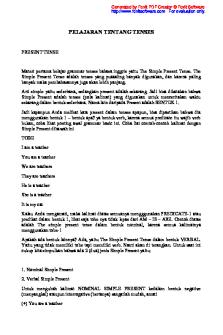
16 tenses bahasa inggris
- 27 Pages
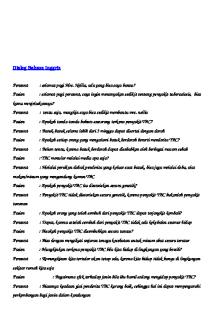
Dialog Bahasa Inggris
- 4 Pages

SKKD BAHASA INGGRIS SMK
- 3 Pages

MAKALAH PEMBELAJARAN BAHASA INGGRIS
- 57 Pages
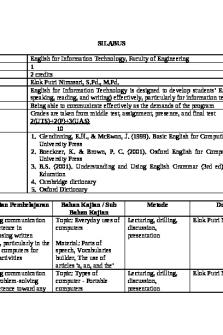
SILABUS BAHASA INGGRIS TI
- 4 Pages
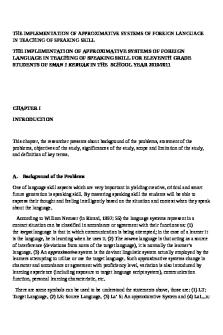
CONTOH SKRIPSI BAHASA INGGRIS
- 24 Pages

CBR bahasa inggris bisnis
- 24 Pages

Ujian Wacana Bahasa Inggris
- 5 Pages

Tugas bahasa inggris
- 1 Pages
Popular Institutions
- Tinajero National High School - Annex
- Politeknik Caltex Riau
- Yokohama City University
- SGT University
- University of Al-Qadisiyah
- Divine Word College of Vigan
- Techniek College Rotterdam
- Universidade de Santiago
- Universiti Teknologi MARA Cawangan Johor Kampus Pasir Gudang
- Poltekkes Kemenkes Yogyakarta
- Baguio City National High School
- Colegio san marcos
- preparatoria uno
- Centro de Bachillerato Tecnológico Industrial y de Servicios No. 107
- Dalian Maritime University
- Quang Trung Secondary School
- Colegio Tecnológico en Informática
- Corporación Regional de Educación Superior
- Grupo CEDVA
- Dar Al Uloom University
- Centro de Estudios Preuniversitarios de la Universidad Nacional de Ingeniería
- 上智大学
- Aakash International School, Nuna Majara
- San Felipe Neri Catholic School
- Kang Chiao International School - New Taipei City
- Misamis Occidental National High School
- Institución Educativa Escuela Normal Juan Ladrilleros
- Kolehiyo ng Pantukan
- Batanes State College
- Instituto Continental
- Sekolah Menengah Kejuruan Kesehatan Kaltara (Tarakan)
- Colegio de La Inmaculada Concepcion - Cebu



